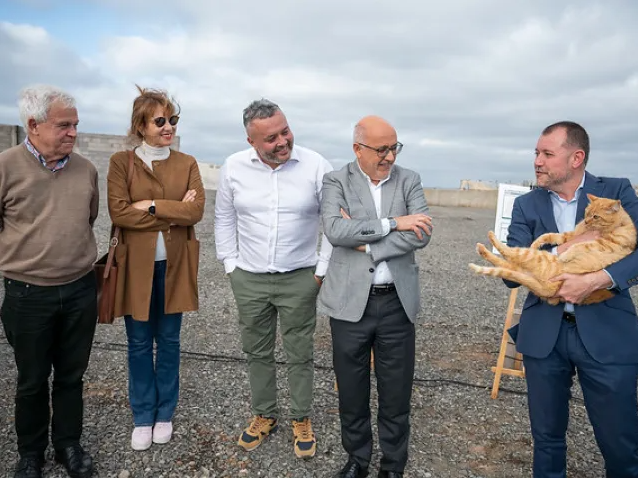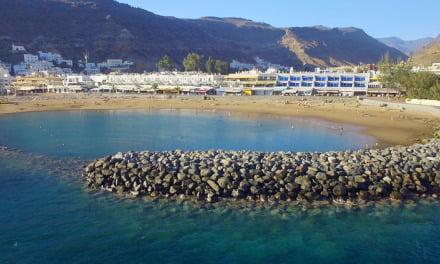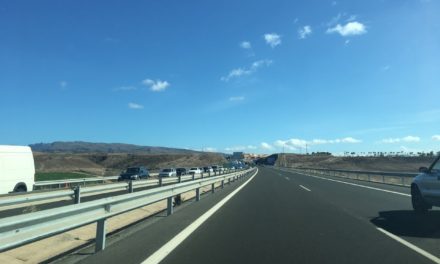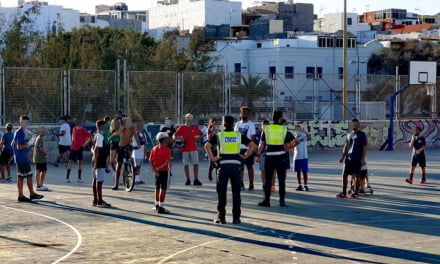 The project to build the Centre for Temporary Stay of Animals (CETA) El Sobradillo broke ground this week with the laying of the first stone in an act which included the citizens of Gáldar with dozens of animals of all kinds of conditions and breeds. This pioneering project will allow Gáldar, on the north coast of Gran Canaria, to dedicate a space that will guarantee the protection of domestic and farm animals, and which will make it the only municipality in Gran Canaria to have facilities with these characteristics to fully comply with European regulations. The centre is to be located on a plot of 3,190 square meters, which will allow it to comply with good hygienic-sanitary conditions and be adequate for the needs of the animals that it will accommodate.
The project to build the Centre for Temporary Stay of Animals (CETA) El Sobradillo broke ground this week with the laying of the first stone in an act which included the citizens of Gáldar with dozens of animals of all kinds of conditions and breeds. This pioneering project will allow Gáldar, on the north coast of Gran Canaria, to dedicate a space that will guarantee the protection of domestic and farm animals, and which will make it the only municipality in Gran Canaria to have facilities with these characteristics to fully comply with European regulations. The centre is to be located on a plot of 3,190 square meters, which will allow it to comply with good hygienic-sanitary conditions and be adequate for the needs of the animals that it will accommodate.
 Antonio Morales, president of the Cabildo de Gran Canaria, and Teodoro Sosa, mayor of Gáldar and advisor to the Presidency of the island institution, led the event together with Inés Jiménez, Minister of the Environment of the Cabildo, the deparrment in charge of Animal Welfare; Carmelo Ramírez, Councillor for Institutional Cooperation of the Cabildo; Rafael Pérez, Councillor for Animal Welfare of Gáldar City Council, and the rest of the municipal government group. The project, which has a budget of €469,806.95, has been made possible thanks to a grant from the Cabildo of €354,000, while the rest of the funds come from municipal contributions.
Antonio Morales, president of the Cabildo de Gran Canaria, and Teodoro Sosa, mayor of Gáldar and advisor to the Presidency of the island institution, led the event together with Inés Jiménez, Minister of the Environment of the Cabildo, the deparrment in charge of Animal Welfare; Carmelo Ramírez, Councillor for Institutional Cooperation of the Cabildo; Rafael Pérez, Councillor for Animal Welfare of Gáldar City Council, and the rest of the municipal government group. The project, which has a budget of €469,806.95, has been made possible thanks to a grant from the Cabildo of €354,000, while the rest of the funds come from municipal contributions.
Antonio Morales, president of the Cabildo de Gran Canaria, showed “enormous gratitude to Gáldar and their municipal government for their effort and perseverance so that this project has become a beautiful reality.”
“In recent years, luckily the abandonment of animals in Gran Canaria has decreased, but the situation overwhelmed us and we needed to involve all the Town Halls,” he continued.
“That is why we called the pact of all the mayors and Gáldar joined from the first moment. And he put the mechanisms in place to make the first stone of an innovative, benchmark center a reality and one that should lead the way for all the municipalities of Gran Canaria”, Morales stressed.
Teodoro Sosa, mayor of Gáldar, went on to stress that with this project he had “clear ideas from the beginning” and praised the councillor, Rafael Pérez, for his work to move CETA forward: “It has cost us less than it should because it is in his blood and he enjoys his work,” he explained.
“Gáldar has assumed a pact of the 21 mayors, the municipalities have the obligation to lead animal welfare because it is our competence and we have taken a step forward,” he said. However, he reiterated that the centre “was not born with a municipal ambition but a regional one, we are an example of caring for and protecting animals.”
 Inés Jiménez, Minister of the Environment, the area in charge of Animal Welfare, thanked “Gáldar, for the region and for all the people who love animals, that they are cared for, healthy and in good condition” making this dream come true. “We have to return the generosity that they offer us to the animals and give them an adequate space so that they have their needs covered and their subsequent adoption is possible,” she valued.
Inés Jiménez, Minister of the Environment, the area in charge of Animal Welfare, thanked “Gáldar, for the region and for all the people who love animals, that they are cared for, healthy and in good condition” making this dream come true. “We have to return the generosity that they offer us to the animals and give them an adequate space so that they have their needs covered and their subsequent adoption is possible,” she valued.
Carmelo Ramírez, Councilor for Institutional Cooperation of the Cabildo de Gran Canaria, thanked the government group for its effort to carry out “a dignified and proper shelter”, and mentioned that “it will be a centre with a regional character and that it will alleviate pressure on the insular centre. I hope there will be centres like this in all the regions of the island, although there are already municipalities that have planned it”, and announced that “from the Cabildo we will continue collaborating with the municipalities to respond to this responsibility that comes from the municipalities.”
Rafael Pérez, Councilor for Animal Welfare of the Gáldar City Council, recalled that as soon as he took office, work began on the construction of a temporary centre for the shelter of animals somethin “beautiful, that does not look like a prison and that gives abandoned animals a second chance”. In addition, he stressed that the facilities “are prepared to accommodate any type of animal in the event of an unexpected event such as a fire.”
The construction will have a reception, administration, operating room, and laundry building, as well as a reception space, a recreation area and an area for small, and large dogs, cats, and a separate space for equine, goat, and sheep pens. Meanwhile, in the second phase, a second building with more sanitary services will be built.
In this way, this space, which previously was used as a dairy farm, will become a pioneering and modern centre in terms of its approach and distribution, and with it, one of the priorities of the municipal government group will become a reality. A year ago, this pioneering project received the go-ahead from the Government of the Canary Islands, since the land where it is going to be carried out is located in a strip of easements for the protection of the maritime-terrestrial public domain.














